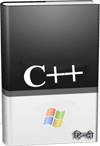Types of Integer in C++: जब हमें किसी Variable में ऐसी संख्या Store करनी हो जो पूर्णांक हो, तो हम Integer प्रकार के Data Type का Variable Declare करते हैं। इस प्रकार का Variable Memory में 2 Byte या 16 Bit की Space लेता है इसलिए ये अधिकतम -32768 से 32767 तक का मान Store कर सकता है। इस प्रकार के Data Type का प्रयोग छोटे पूर्णांकों को Memory में Store करने के लिए होता है।
| Type Name | Size | Range |
| char | 1 byte (8 bits) | -128 to 127 |
| short | 2 bytes (16 bits) | -32,768 to 32,767 |
| int | Same as short on 16-bit systems | Same as long on 32-bit systems |
| long | 4 bytes (32 bits) | -2,147,483,648 to 2,147,483,647 |
short प्रकार के Variables हमेंशा Memory में 2 Byte की Space Reserve करता है और ये –32768 से 32767 तक के मान को Store कर सकता है। Long प्रकार का Variable हमेंशा Memory में 4 byte की Space लेता है और ये –2147483648 से 2147483647 तक के मान को Store कर सकता है।
16-Bit Computers में int व short प्रकार का Variable 2 Byte Reserve करता है जबकि 32-Bit Computers में ये 4 Byte Reserve करते हैं और 16-Bit Systems की तुलना में अधिक मान को Memory में Store कर सकते हैं। DOS व Windows 3.1 16-Bit Systems हैं। Windows 95/98 Unix, Linux आदि 32-Bit Systems हैं।
Integer प्रकार के मान को Store करने के लिए int प्रकार के Variable का प्रयोग सबसे ज्यादा होता है, चाहे हम 16-Bit OS Use करें या 32-Bit OS लेकिन यदि हम 32-Bit OS पर कम Space Use करने के लिए int प्रकार के Variable को 2 byte का रखना चाहते हैं, तो हम short का प्रयोग कर सकते हैं। इसी तरह यदि हमें 16-Bit OS पर 4 Byte का Integer Store करना हो तो हमें long प्रकार का Variable लेना होगा।
int KeloMeters; // Variable Declare किया गया है।
long CentiMeters;
KeloMeters = 1024; // Variables को मान Assign किया गया है।
CentiMeters = 1405836L;
यहां हमने Centimeters को मान Assign करने के बाद L का प्रयोग किया है, क्योंकि 16-Bit System में Integer 2 Byte का होने की वजह से ये मान Fit नहीं हो सकता। 16-Bit System में इस मान को मान्यता देने के लिए यहां L का प्रयोग करना जरूरी है।
Types of Integer in C++: Unsigned Integers
जब हमें किसी Variable में केवल पूर्णांक मान ही Store करने होते हैं साथ ही हमें Variable में केवल Positive मान ही Store करने होते हैं, तब हम Variable को Unsigned प्रकार का Declare करते हैं। इससे Variable की Data Store करने की Range दुगुनी हो जाती है। यानी Negative व Positive Limit की जोड के बराबर हो जाती है।
| Type Name | Size | Range |
| unsigned char | 1 byte (8 bits) | 0 to 255 |
| unsigned short | 2 bytes (16 bits) | 0 to 65,535 |
| unsigned int or unsigned | Same as unsigned short on 16-bit systems | Same as unsigned long on 32-bit systems |
| unsigned long | 4 bytes (32 bits) | 0 to 4,294,967,295 |
unsigned Keyword के बिना हम जो भी Variable Declare करते हैं, By default वे सभी signed Variables होते हैं। हम चाहें तो Variable के साथ signed Keyword का प्रयोग कर सकते हैं, लेकिन ऐसा करना जरूरी नहीं है। (Types of Integer in C++)
 ये Article इस वेबसाईट पर Selling हेतु उपलब्ध EBook C++ Programming Language in Hindi से लिया गया है। इसलिए यदि ये Article आपके लिए उपयोगी रहा, तो निश्चित रूप से ये पुस्तक भी आपके लिए काफी उपयोगी साबित होगी।
ये Article इस वेबसाईट पर Selling हेतु उपलब्ध EBook C++ Programming Language in Hindi से लिया गया है। इसलिए यदि ये Article आपके लिए उपयोगी रहा, तो निश्चित रूप से ये पुस्तक भी आपके लिए काफी उपयोगी साबित होगी।
C++ Programming Language in Hindi | Page: 666 | Format: PDF
